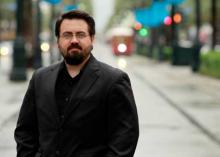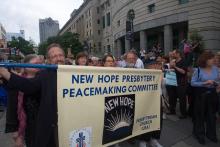Pastors

JULIE OWENS had no way of knowing that, within days of saying her marriage vows, she would become a victim of domestic violence. She grew up in a Christian home. Her father was a pastor. Her brother was a pastor. Her uncles were pastors. Her parents had a beautiful and enduring marriage. She was well educated. She was well traveled. And she was deeply in love.
During her honeymoon, Julie quickly realized that her husband now believed he owned her, a belief that would soon be followed by verbal abuse and, toward the end of their marriage, physical abuse.
The abuse began with an irrational jealousy. Then the name-calling began, along with accusations of infidelity. He isolated her from her friends and family. He showed up at the school where she worked as a special education teacher to “check on her.” Later, he started taking the car keys away from her. He even cut the spark-plug wires in their car so that he would always know her whereabouts. He threw dishes at her, disconnected the phone in their rural home, and threatened to harm her, their pets, friends, and even their unborn baby.
Three months into the marriage, Julie knew that his behavior was not normal and the couple separated.
Over the course of the next three months, she went to marriage counseling while her husband went to substance-abuse counseling. In search of help, she spoke with counselors, pastors, and others—yet not one of them ever uttered the words “domestic violence.” Instead, she was told that her husband was dealing negatively with “stress” and that he was “acting out” because he was raised in an abusive family.

In an evangelical Christian climate obsessed with change, cultural trends, and trying to stay up-to-date and relevant, it's easy to undervalue the elderly. The bestselling authors, the hottest worship bands, the superstar conference speakers, and megachurch pastors are all youngish, or at least certainly not elderly, and they’re mainly marketed towards younger to middle-aged audiences.
In many ways, Christians have suffered from the sin of apathy, being guilty of ignoring a large segment of believers — the elderly — who are continually forced into the shadows of our ministries, leadership structures, publicity campaigns, vision, and dialogue.
In an era where fast-paced technology rules the world, elderly Christians are losing their platforms for communication — and the rest of us are too busy to reach out to them. Social media, blogs, websites, tablets, and smartphones continually shrink access to an elderly population that is unable to keep up — and we aren’t waiting for them.

By definition, skeptics are pretty skeptical. They question what they see as unfounded claims or dubious motivations, whatever the source. Now, they are questioning some of their own leaders.
With the success of organizations such as The Clergy Project — an online community seeking to provide a safe place for clergy members who reject supernatural beliefs — numerous former ministers are joining the ranks of the publicly nontheistic.
Some have risen to the leadership of prominent atheist organizations. Last week, Teresa MacBain was dismissed from her high-profile position at Harvard University’s Humanist Community after it was revealed she inflated her resume. The former United Methodist pastor claimed a degree from Duke Divinity School she did not have.
“Our society needs so much and thriving secular communities could make significant contributions, ” wrote Donald Wright, author and organizer of the Day of Solidarity for Black Non-Believers, on Freethought Blogs. But, he added, “My unsolicited advice is to be skeptical of this new wave of leadership.”

Microsoft CEO Steve Ballmer’s surprise decision to retire does more than throw the technology industry into a frenzy of speculation. It raises the problem of succession.
From major corporations to startups led by visionary leaders, from universities to churches, the departure of the top leader can stop momentum and usher in months, perhaps years, of uncertainty.
Even though dealing with succession is a primary task for a board of directors — some say it’s their preeminent task — relatively few boards take the assignment seriously. They focus instead on the easier work of jousting with the top leader and shilling for institutional investors.
What should be an orderly process of preparing for leadership transition instead becomes a lurching from one standalone regime to the next.
Many board members want the rush of being co-managers of the institution. This is especially true in churches, where boards enjoy making day-to-day decisions about operations. Since a strong central leader would get in their way, many church councils discourage strong clergy and reward compliant permission seekers.

I just got back a few days ago from a campsite outside of Asheville, N.C., the site of the third annual Wild Goose Festival. For those who are unfamiliar with the event, imagine and old-fashioned days-long outdoor revival, combined with Bonaroo and a traveling circus. For several days, authors, activists, artisans, musicians, and seekers converge to engage in spontaneous community, share ideas and to inspire one another.
It's not every day that you can walk by a makeshift tent and listen to Phyllis Tickle succinctly summarize the history of Christendom in 45 minutes, and then wander over and pick up a vegetarian pita sandwich while on your way to hear the Indigo Girls perform. Impassioned conversations emerge all on your walk about everything from child trafficking to the state of the institutional church in the 21st century. And you're only momentarily distracted by the guy on stilts, wearing a hat covered in goose feathers who wanders by for no apparent reason.
Welcome to Wild Goose.
THE LEADERSHIP of 12Stone Church, a multi-campus congregation based in Gwinnett County, Ga., became increasingly concerned about how home foreclosures, rampant unemployment, and other financial strains were impacting families in metro Atlanta. They set an ambitious goal of providing relief to 5,000 families in their church and community. Eventually they raised more than $550,000 through designated gifts, many from church members who were themselves unemployed.
Partnering with the HoneyBaked Ham Company, Kroger grocery stores, and other area sponsors, the 12Stone Church members distributed food to needy families, culminating with a day of giveaways in the parking lot of Coolray Field, home to the Gwinnett Braves, the local minor league baseball team. People began lining up hours before the event, jamming traffic on nearby I-85. Others slept in their cars overnight to keep from missing out.
Imago Dei Church in Raleigh, N.C., has mercy ministries built into the DNA of the church. They’ve adapted Rick Warren’s PEACE Plan: plant churches, evangelize the world, aid the poor and sick, care for the orphan and the oppressed, and equip leaders.
Working through the Raleigh-based nonprofit Help One Now, Imago Dei is partnering with an orphanage in Haiti and sponsoring children. Through this ministry, the church is providing basic needs, including food, clean water, and health care. They also support education programs so that the children will be equipped to one day provide for their own families.

Since state legislators were taken over by the Koch brothers, many progressive clergy have spent our entire discretionary accounts on travel to our state capitals. We attend on behalf of equal marriage, the living wage, campaign finance reform, fracking, or low wage workers. While trying to be faithful, we are, also, in the great words of Joseph Sittler, “macerated” by our citizen involvements.
But an experiment is occurring in North Carolina to de-macerate and reunite our spiritual souls with our political bodies. Instead of episodic lobbying, on Moral Mondays, clergy visit with their representatives as chaplains. They change the language from the pragmatics of the political to the hope of our God. They pass through the wilderness of the secular and its optimism and arrive at the land of hope. They talk about the downtrodden in meaningful ways with state legislators.

For many pastors of urban congregations, “stepping up” to end gun violence stems from a very personal place — as they have been forced to bury their own neighbors and church members. According to Samuel Rodriguez, gun violence – especially in urban areas – deeply affects interfaith leaders there, who are declaring violence-free zones and taking action.
Faith-based leaders in Philadelphia and Chicago have rallied to fight gun violence. Heeding God’s Call, based in Philadelphia, holds prayer vigils at the locations of gun homicides as well as organizes gun-store campaigns that ask gun store owners to sign a code of conduct.
In Chicago, All Saints Episcopal Church organized CROSSwalk, a walk through downtown Chicago, which drew a few thousand people the past two years. Violence on Chicago streets has killed more than 800 young people in the last six years.
Nuenke addressed breaking the chain of violence and pain that we see in every community. He quoted 2 Corinthians 1:3-4 and Isaiah 61 as examples of God’s compassion and its life-changing, healing power.
“What would happen if the body of Christ more fully was involved in living out Christ’s compassion in a broken world?” Nuenke asked. “Sometimes people who are hurt or experience violence end up hurting other people. The care and compassion they might receive from the Lord Jesus will impact them more in 20-30 years than anything else.”
FOR MANY IN the global South, climate change is not an abstract theory. Victor Mughogho, executive director of the Eagles Relief and Development Programme in the southeast African country of Malawi, has experienced firsthand the toll of global warming and extreme weather. He works with local churches to develop practical and faithful solutions to mitigate the effects of climate change. Sojourners assistant editor Elaina Ramsey interviewed Mughogho early last year when he visited Washington, D.C.
Elaina Ramsey: How has climate change affected the people of Malawi?
Victor Mughogho: The impacts are quite severe on the ground. Rural people in Malawi constitute about 85 percent of the population. These people are subsistence farmers. For them, rainfall is everything. Without the rain, there's no agriculture, no livelihood.
The weather patterns have changed and are so unpredictable now. In the past 20 years, official records from the government show that we've had five severe droughts. Because of the cycles of drought, there is less and less water in the ground. The water table is sinking. Trees and grass are stunting and rivers are drying up.
If you asked a person "What will happen in the next 10 or 20 years?" they'd say that what's bad now, in retrospect, is going to look like a good time. It looks like worse times are coming ahead.
A majority of Protestant pastors plan to vote for GOP presidential nominee Mitt Romney, according to a new survey, but nearly a quarter are still undecided less than a month from Election Day.
Just 17 percent of Protestant pastors said they would vote to re-elect President Obama, with 57 percent favoring Romney and 22 percent undecided, according to a survey conducted by LifeWay Research.
Based in Nashville, Tenn., the research firm is a branch of LifeWay Christian Resources.
The results are remarkably similar to a LifeWay survey conducted in October 2008, which found that 55 percent of Protestant pastors planned to vote for then-GOP nominee John McCain, 20 percent for Obama and 22 percent were undecided.

Today, Sojourners is launching a new project called Emerging Voices, and it’s one of the most exciting things I have been involved with for a long time. It aims to mentor, develop, and promote the most dynamic up-and-coming communicators — speakers, preachers, and teachers — who so clearly are called to lead and publicly articulate the biblical call to social justice.
The vision for this project is exciting and something to be celebrated. It also calls to mind a critical observation: Our world often wants saviors, not prophets; new messiahs, not leaders.
We want heroes with superhuman strength who save the day, not mere mortals who speak the truths we typically don’t want to hear. Even the modern day giants of social justice — Dr. Martin Luther King Jr., Dorothy Day, and Mahatma Gandhi, for example —were at best prophets, but never saviors.
It’s easy to slip into the mentality that one person, one voice will rise up in a generation, and that he or she will change the world as we know it. Perhaps we even think, “Maybe I will change the world.”
Mars Hill Bible Church has appointed a new teaching pastor, months after founding pastor and well-known author Rob Bell departed for California.
In an email sent on Wednesday to members of the Grandville, Mich., church, leaders announced Kent Dobson had accepted the lead position.
Dobson served as a worship director in the church’s early days and has preached as a guest speaker in the months since Bell left. He is the son of Ed Dobson, pastor emeritus at Calvary Church in Grand Rapids.

Most members of the clergy are taught to put the physical and spiritual needs of others first, but that self-denial may be harmful to their own health, according to a new Duke University study.
Studies of United Methodist pastors in North Carolina found high rates of chronic disease and depression, and researchers worry it can be difficult to convince clergy to seek help.
To address these unique problems, Duke Divinity School's Clergy Health Initiative developed a program to provide preventative care in a spiritual context.
The National Association of Evangelicals is urging pastors to seek a common moral ground by uniting under a consistent code of ethics.
NAE leaders said the new code will provide uniform guidance to church leaders across the 40 denominations that comprise the nation’s largest evangelical group.
The new code is a good starting point for ministers in a profession that can be individualistic and entrepreneurial, said David P. Gushee, a professor of Christian ethics and director of the Center for Theology and Public Life at Mercer University.
“In some ways it’s the Wild West out there in terms of the context of preparation for ministry in the evangelical world,” he said. “Any effort to raise the moral bar and establish a minimal set of expectations for clergy — or any profession — is a very good thing.”

In light of some recent intense posts - Ultimate Fighting Jesus and Conversation with Rob Bell (re: women in ministry), this list is too funny not to share.
But the brutal fact is that the matter of gender violence isn’t all that funny either. Statistics about gender inequality via UN and UNICEF are even more discouraging.
Regardless where you sit, stand, or wrestle with the issue of women in church leadership, I thought this satirical list was worth sharing for both laughter and even reflection because that’s what good satire forces us to do. And for what it’s worth, I’d encourage you to read some of my thoughts about why I believe women should be included in all levels of church leadership.
In an op-ed published today in the Charlotte Observer, Mike Daisley calls for Christians to "tone down the religious rhetoric."
Of course, the influence of religious belief on political discourse is nothing new. In the Bill of Rights, the very first phrase of the First Amendment contemplates the delicate balance of church and state. It has been challenging us ever since.
The issue of school prayer is but one example. Never mind that the Supreme Court on numerous occasions has ruled that only government-coerced prayer or state-sponsored prayer is unconstitutional. This fact has failed to dissuade numerous conservative groups from raising millions by suggesting that little Johnny could be taken away in handcuffs if the godless secularists who "outlawed prayer in schools" aren't stopped.

Does theology matter when it comes to evaluating political leaders? How does this whole faith and politics thing work?
Both Barack Obama and Rick Santorum have strong records on supporting legislation and funding policies that fight global poverty and pandemic diseases. Both men have talked about how their concern for the poor is motivated by their faith.
I feel comfortable with that and I think most people do. It is an example of political figures expressing their personal motivation behind widely held values that aren’t exclusive to a particular religious tradition.
There are some religious beliefs, such as a particular stance on infant baptism, understanding of the Trinity, or belief in what occurs when Christians observe the Lord’s Supper that are significant theological claims. But they aren’t good or appropriate benchmarks by which to evaluate political candidates.
What was most telling about the disagreement between the two men was their discussion of Luke 4. Mohler argued the passage should be understood in light of how he interpreted the preaching and teaching of Paul and the other apostles. This means that when Jesus said that he came to bring good news to the poor that good news was personal salvation.
Wallis argued that yes, personal salvation is one part of that good news, but that the other part is the Kingdom of God breaking into the world and transforming societal relationships as well. When the Gospel is proclaimed, it is good news for a poor person's entire being, community and world -- not just his or her soul.
First, it was encouraging to hear Mohler spend a lot of time emphasizing that working for justice is essential to fulfillment of the Great Commission. Throughout the night he repeated his concern that a lot of Churches are REALLY bad at making disciples who actually do the things Jesus told us to do. As the president of one of the largest seminaries in the world, it will be interesting to see if he is able to train a generation of pastors who will do things differently. My concern is that he is missing the connection between his theology and the failure of Christians to actually do justice.
Scripture constantly should be challenging our assumptions about our lives and in every aspect of society. Transformation is needed on a personal and also a political level. Scriptural priorities shouldn't be glossed over in order to protect political ideologies and comfort zones.
If we believe that what Jesus taught remains just as relevant today as it did when he physically walked among us, then it should still be a comfort to those on the margins of society and offensive to the wealthy and powerful. That doesn't mean that the wealthy and powerful can't be good and faithful followers of Christ, but Jesus did warn them that their walk will be a hard one. Wealth and power bring unique and difficult temptations ... If you never feel uncomfortable when you read the Gospels then you aren't paying attention.
In recent days I've been thinking through with a friend one of the enduring challenges of pastoral and catechetical ministry: how to dispel the notion that worship should be entertaining. It's not as hard as it used to be -- there are books (and blogs) on the subject; it gets preached on fairly often these days. But it's not as easy as it ought to be. It seems we are a species ever in need of amusement.
One of the most compelling arguments against the persistent idea that worship ought to entertain, dazzle, distract, or otherwise charm us is found in James Alison's insight that true worship is "orchestrated detox."
